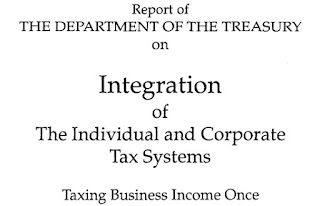 |
| Senator Orrin Hatch (R-UT) |
Senator Hatch, chair of the Senate Finance Committee, has done the following regarding tax reform:
- Study and hearings on corporate integration as a way to reduce the corporate tax burden. The proposal (per statements rather than a report) is a dividends paid deduction with withholding.
- Hearing on 5/24/16 - Debt vs. Equity: Corporate Integration Considerations (+ JCT report).
- Hearing on 5/17/16 - Integrating the Corporate and Individual Tax Systems: The Dividends Paid Deduction Considered (+ JCT report).
- 6/16/17 – Press release asking for people to submit suggestions for tax reform by 7/17/17. He seeks recommendations in four areas:
- “1. Providing much-needed tax relief to middle-class individuals and families through reforms to the individual income tax system;
- 2. Strengthening businesses – both large and small – by lowering tax rates and broadening the relevant tax base in order to put the economy on a better growth path and create jobs;
- 3. Removing impediments and disincentives for savings and investment that exist in the current tax system; and
- 4. Updating our international tax system in order to make our nation more competitive in the global economy and preserve our tax base.”
- 6/27/17 – In a speech on the Senate floor, Hatch said he is “committed to ensuring a robust process in the Senate for developing, considering, and passing any tax reform package. That is how the Senate functions best, and that is what I intend to see happen.” He also noted that he has “been working to involve all the Republican members of the Senate Finance Committee in this effort. We have a number of great senators on the committee, many of whom have put in years of work on different areas of the tax system.”
- He also noted he had given assignments to some SFC members, such as:
- · Enzi and Portman – international tax· Grassley – individual tax· Thune – business and estate taxes· Heller and Cassidy – energy tax policy· Roberts – agriculture tax issues
- Senator Hatch noted that tax reform would not be a “closed-door exercise” in the Senate. He also wants members outside of the Senate Finance Committee to be involved and he wants “to see Democrats at the table” and a “bipartisan process that renders a bipartisan result..
- His final remarks:
“At
the end of this process, no one should be able to credibly claim that they were
unable to participate or that they didn’t have enough information about the
bill. So, I hope this puts to rest any claims or suppositions that the
tax reform process is going to be secretive in nature. Because, if I have
my way, this process will be both open and bipartisan.
The
goal of everyone in this body with respect to tax reform ought to be to help
the American people by providing tax relief to American families, simplifying
the tax system, improving our business tax system to allow American businesses
to compete in the global economy, and create stronger growth in the economy,
wages, jobs, and opportunity.
I
hope more of my colleagues will join me in supporting this important effort.”
What do you think? Will we see permanent, comprehensive tax reform this year?










